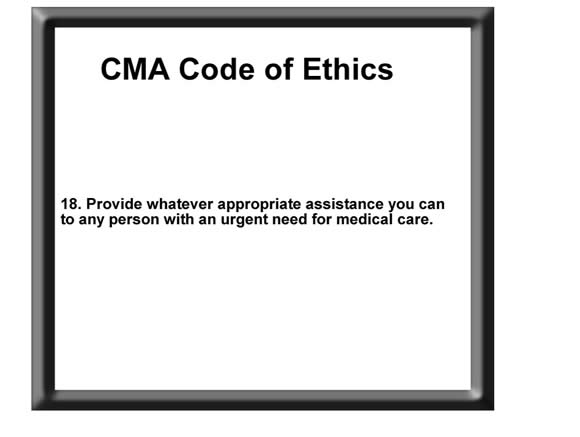Duty of Care
Emergencies
The question about whether any doctor has a legal obligation to provide emergency services to someone who is not their patient is unclear.
The older more traditional view was that they need not undertake the care of someone who is not already their patient, even in the case of an emergency.
Woods v Lowns (Australian)
A young man had a very severe and prolonged seizure about 300 m away from a doctor's office. His sister ran to the office and asked for help and the doctor refused. The young man suffered from severe brain damage.
He and his family sued the doctor. The New South Wales court found that notwithstanding the the general rule that a doctor is free to refuse to accept a new patient, in the particular circumstances of this case, the doctor was under a legal obligation to help. Emphasis was placed on the medical profession's code of ethics (included in New South Wales legislation) which requires doctors to provide emergency assistance if requested.
The Canadian Medical Association's code of ethics also requires that doctors "shall except in an emergency have the right to refuse to accept a patient "
Egedebo v. Windermere District Hospital Association (1993, British Columbia Court of Appeal)
A doctor who was working in the emergency department, but not "on call", was advised that a person had arrived in need of emergency care. The patient had signs and symptoms of spinal cord compression. The doctor decided that the patient should wait to see the doctor who was assigned to "on call" duty - even though he knew that this doctor was in the operating room and would not be able to see the patient for two hours. The patient suffered permanent injuries.
In the subsequent negligence action the court held that, even though the doctor was not on call, there was a sufficient "relationship of proximity" between the patient and the doctor such that, in the reasonable contemplation of the doctor, his acts or omissions would be likely to affect the patient. His refusal to provide treatment where he knew or ought to have known that no other physician was available constituted a breach of his duty of care to the patient. The court also held that the physician had an ethical obligation to provide assistance.
Good Samaritan Legislation
In most provinces, a doctor or a nurse who voluntarily provides emergency treatment where there are inadequate facilities is protected by statute - commonly referred to as "Good Samaritan legislation" . The purpose is to encourage health care professionals to stop at the scene of an accident by providing immunity from liability in the absence of gross (very great) negligence.
References:
The legal duty of physicians and hospitals to provide emergency care. Anne F. Walker This Article. CMAJ • February 19, 2002; 166 (4)


